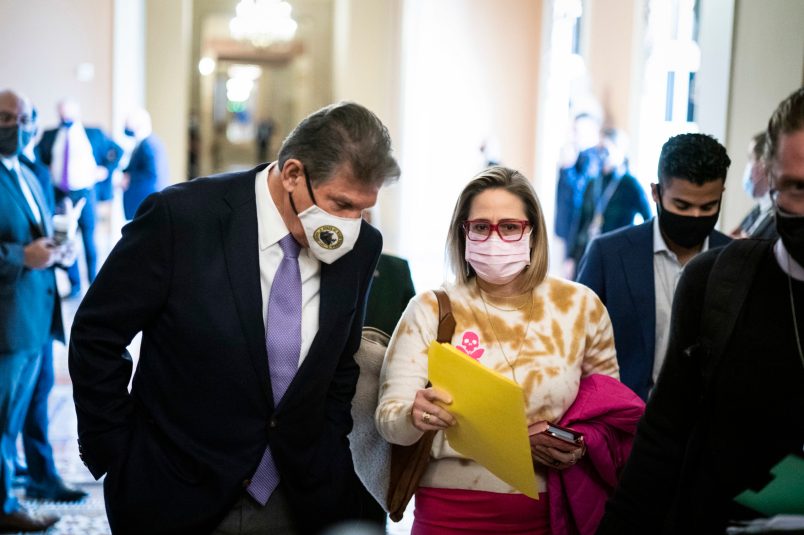Sen. Joe Manchin (D-WV), who jointly unveiled a deal on a reconciliation bill with Senate Majority Leader Chuck Schumer (D-NY) last week, made a public pitch for fellow centrist Sen. Kyrsten Sinema (D-AZ) to back the bill during a series of appearances on Sunday TV shows.
Sinema, who could potentially make or break the deal in the evenly-split Senate, has not issued public comments on it as she awaits the Senate parliamentarian to cut any non-budgetary items from the bill.
During his appearances on Sunday TV shows, Manchin said he was unsure whether Sinema would vote for the bill, but urged her to do so.
Sinema, who has stated her opposition to tax rate increases, previously killed a corporate minimum tax provision of the Build Back Better reconciliation package. The reconciliation deal that Manchin and Schumer announced last week would implement a 15 percent minimum corporate tax, but only on companies of $1 billion or larger. Sinema has since stated her support of such a tax when it comes to corporations making $1 billion or more in profits.
During an appearance on CNN, Manchin said Sinema is a “dear friend” of his and “has so much in this legislation.”
Manchin said Sinema “formed quite a bit” of the bill, pointing to a provision of the bill that gives Medicare the authority to negotiate the reduction of prescription drug prices.
“And I agree with her 100 percent in that we are not going to raise taxes and we won’t,” Manchin said. “When she looks at the bill and sees the whole spectrum of what we’re doing and all of the energy we’re bringing in all of the reduction of prices and fighting inflation by bringing prices down, by having more energy, hopefully, she will be positive about it. But she will make her decision. And I respect that.”
Manchin spoke similarly of Sinema during an interview on NBC’s “Meet the Press,” saying that she had “tremendous input” in the legislation.
“She basically insisted on no tax increases, we’ve done that. And she was very, very adamant about that, I agree with her,” Manchin said. “She was also very instrumental in making sure that we had drug prices that Medicare could compete on certain drugs to bring it down.”
Manchin reiterated his claim that there is “an awful lot” that Sinema brought to the bill during an appearance on ABC News, citing its Medicare and corporate tax provisions.
“The way it’s been designed as far as the reduction of Medicare, letting Medicare go ahead and negotiate for lower drug prices — she’s very involved in that. And I appreciate that,” Manchin said. “Also, basically when she said: taxes, we’re not going to raise taxes, I agree with that.”
Manchin’s back-to-back appearances on Sunday TV shows follows President Biden’s call for Congress to pass the Manchin-Schumer reconciliation deal, which also includes modest provisions on climate investments.
During a press conference addressing “The Inflation Reduction Act of 2022” last week, Biden touted the bill as “historic” and a “godsend” for families.
The President touted the bill’s corporate tax provision, while also acknowledging that the agreement is a “compromise” and “far from perfect.” But Biden stressed that progress is made through compromises as he urged Congress to pass it.
“My message to Congress is this: this is the strongest bill you can pass to lower inflation, cut the deficit, reduce health care costs, tackle the climate crisis and promote energy security, all the time while reducing the burdens facing working class and middle class families,” Biden said. “So, pass it.”
The agreement between Schumer and Manchin was reached weeks after the centrist senator nixed a version of the bill following even more weeks of negotiations.
In addition to its Medicare and corporate tax provisions, the bill invests $369 billion in climate investments over the next 10 years. Some parts of the bill, however, still need to be worked out. It is unclear which drugs Medicare will be able to negotiate down. The climate provisions are also broad, with the bill summary describing them as a “historic down payment” to “reduce carbon emissions by roughly 40 percent by 2030.” Additionally, the bill does not address the State And Local Tax (SALT) deduction cap.
A vote in the Senate for the bill is expected this week. All 50 Democrats in the evenly-divided upper chamber would need to be on board for it to pass, in addition to a simple majority in the House.



